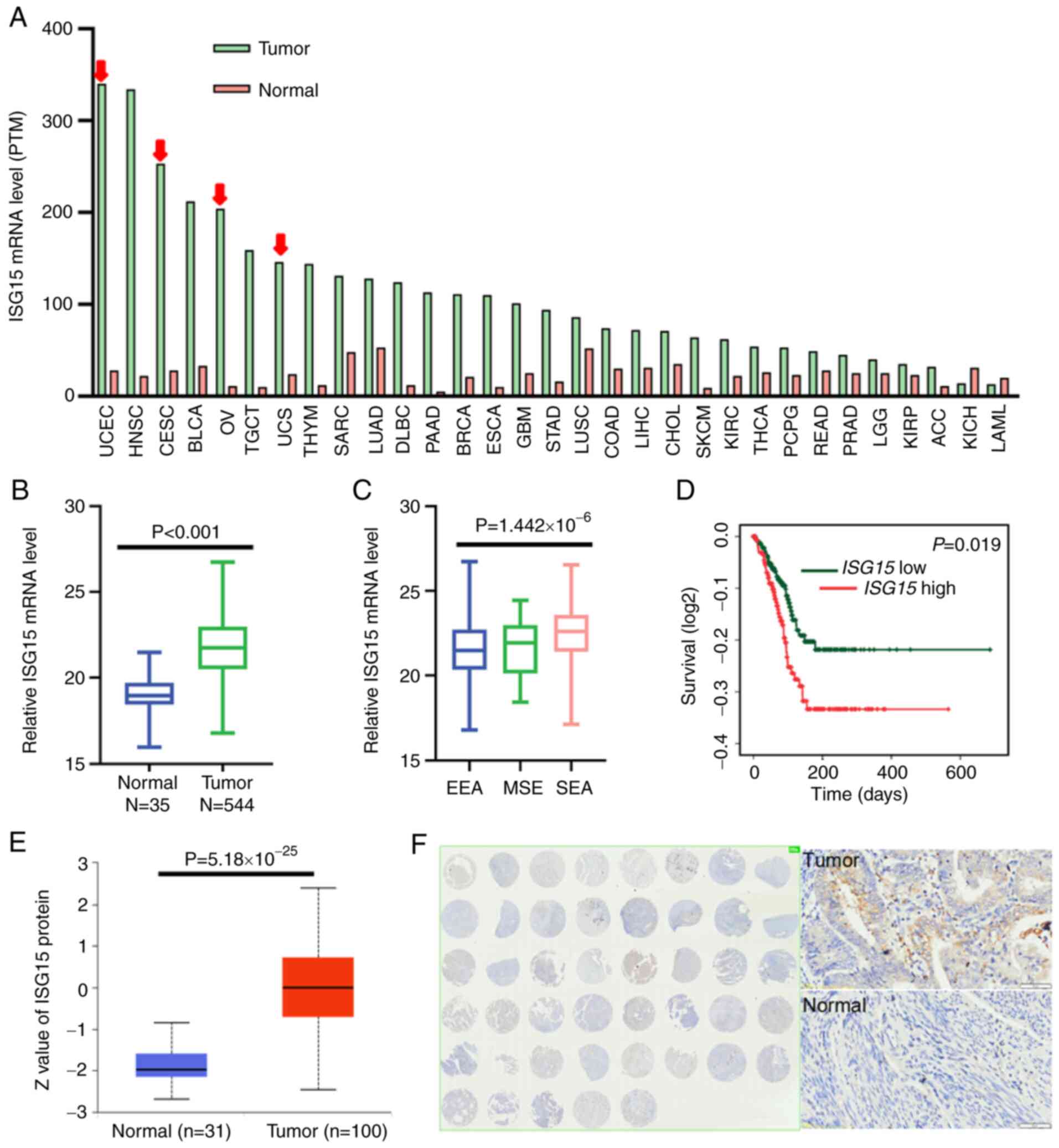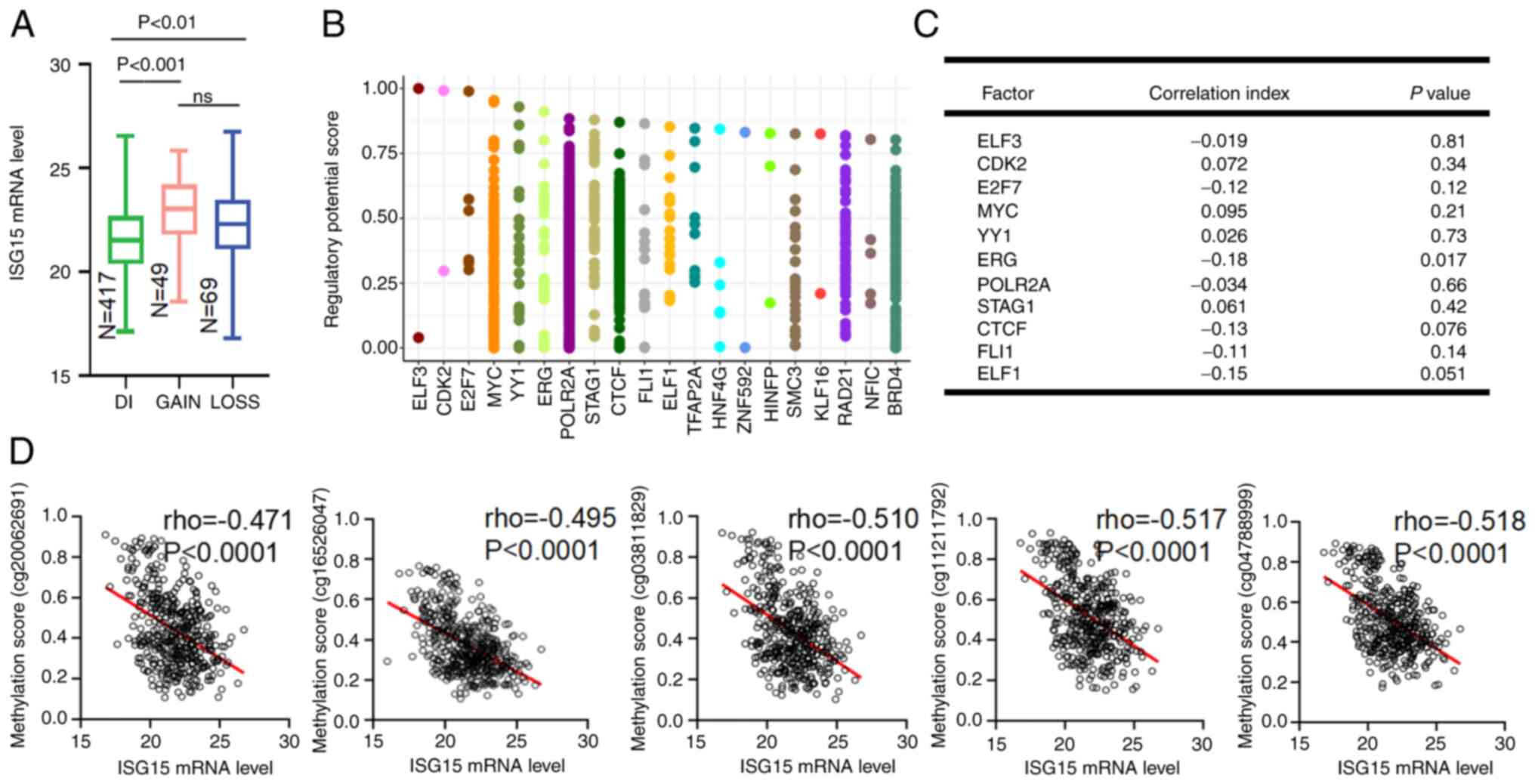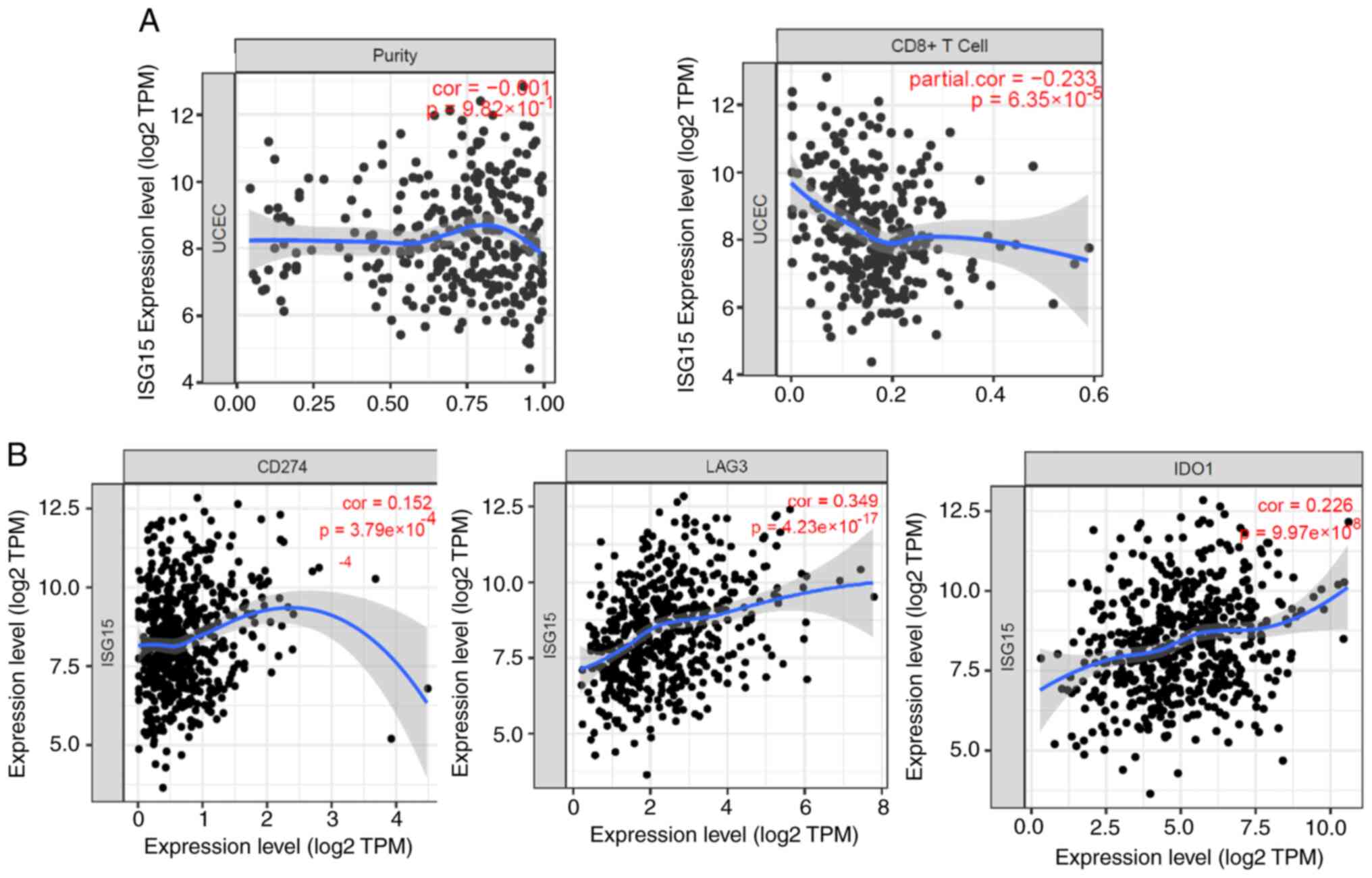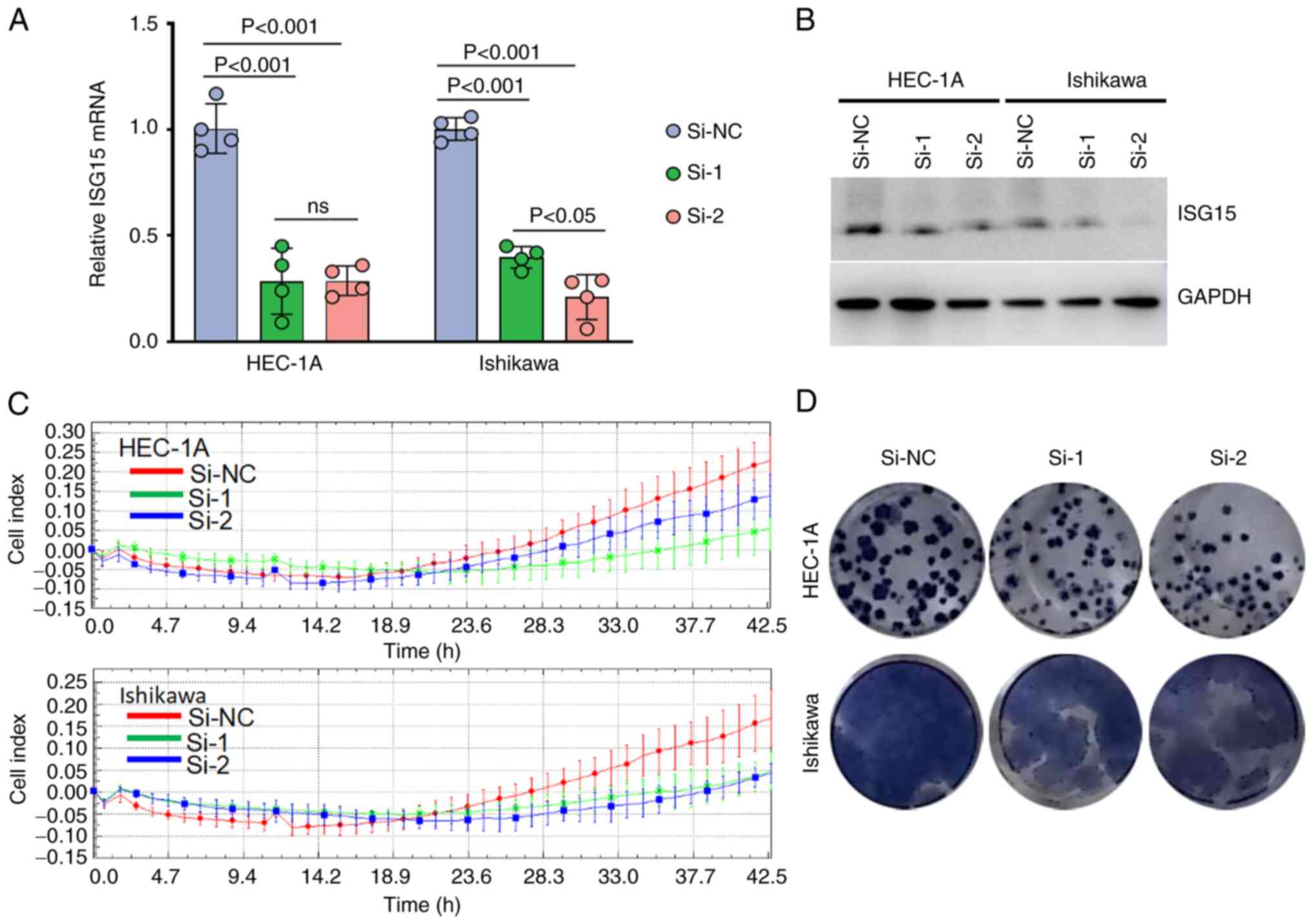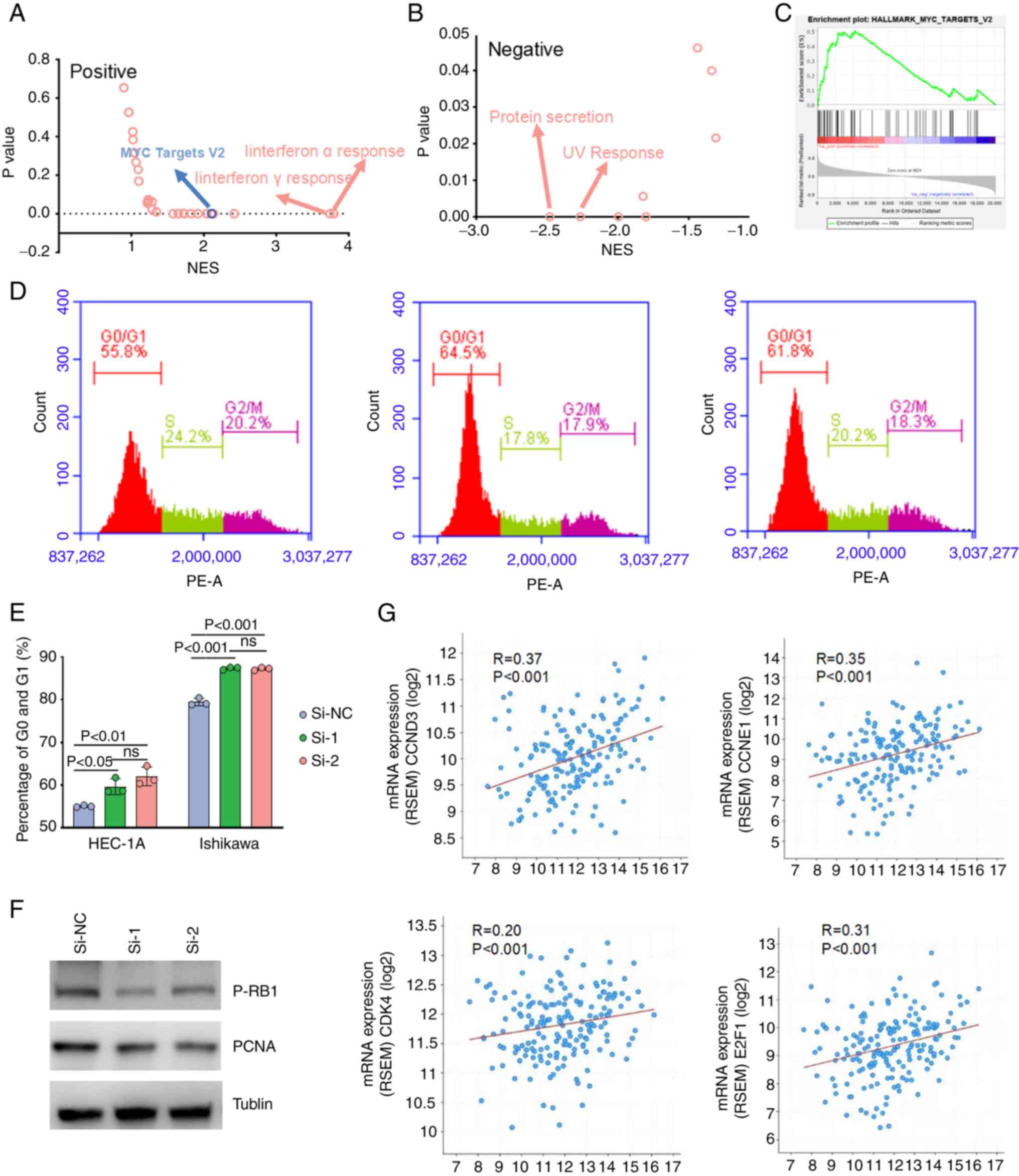|
1
|
Bell DW and Ellenson LH: Molecular
genetics of endometrial carcinoma. Annu Rev Pathol. 14:339–367.
2019. View Article : Google Scholar : PubMed/NCBI
|
|
2
|
Shiozawa T and Konishi I: Early
endometrial carcinoma: Clinicopathology, hormonal aspects,
molecular genetics, diagnosis, and treatment. Int J Clin Oncol.
11:13–21. 2006. View Article : Google Scholar : PubMed/NCBI
|
|
3
|
Buhtoiarova TN, Brenner CA and Singh M:
Endometrial carcinoma: Role of current and emerging biomarkers in
resolving persistent clinical dilemmas. Am J Clin Pathol. 145:8–21.
2016. View Article : Google Scholar : PubMed/NCBI
|
|
4
|
MacKintosh ML and Crosbie EJ: Prevention
strategies in endometrial carcinoma. Curr Oncol Rep. 20:1012018.
View Article : Google Scholar : PubMed/NCBI
|
|
5
|
Lu H, Ju DD, Yang GD, Zhu LY, Yang XM, Li
J, Song WW, Wang JH, Zhang CC, Zhang ZG and Zhang R: Targeting
cancer stem cell signature gene SMOC-2 Overcomes chemoresistance
and inhibits cell proliferation of endometrial carcinoma.
EBioMedicine. 40:276–289. 2019. View Article : Google Scholar : PubMed/NCBI
|
|
6
|
Vu LD, Gevaert K and De Smet I: Protein
language: Post-translational modifications talking to each other.
Trends Plant Sci. 23:1068–1080. 2018. View Article : Google Scholar : PubMed/NCBI
|
|
7
|
Loboda AP, Soond SM, Piacentini M and
Barlev NA: Lysine-specific post-translational modifications of
proteins in the life cycle of viruses. Cell Cycle. 18:1995–2005.
2019. View Article : Google Scholar : PubMed/NCBI
|
|
8
|
Akimov V, Barrio-Hernandez I, Hansen SVF,
Hallenborg P, Pedersen AK, Bekker-Jensen DB, Puglia M, Christensen
SDK, Vanselow JT, Nielsen MM, et al: UbiSite approach for
comprehensive mapping of lysine and N-terminal ubiquitination
sites. Nat Struct Mol Biol. 25:631–640. 2018. View Article : Google Scholar : PubMed/NCBI
|
|
9
|
Shin D, Mukherjee R, Liu Y, Gonzalez A,
Bonn F, Liu Y, Rogov VV, Heinz M, Stolz A, Hummer G, et al:
Regulation of phosphoribosyl-linked serine ubiquitination by
deubiquitinases DupA and DupB. Mol Cell. 77:164–179.e6. 2020.
View Article : Google Scholar : PubMed/NCBI
|
|
10
|
Ribet D and Cossart P: Ubiquitin, SUMO,
and NEDD8: Key targets of bacterial pathogens. Trends Cell Biol.
28:926–940. 2018. View Article : Google Scholar : PubMed/NCBI
|
|
11
|
Cossec JC, Theurillat I, Chica C, Aguín
SB, Gaume X, Andrieux A, Iturbide A, Jouvion G, Li H, Bossis G, et
al: SUMO safeguards somatic and pluripotent cell identities by
enforcing distinct chromatin states. Cell Stem Cell. 23:742–757.e8.
2018. View Article : Google Scholar : PubMed/NCBI
|
|
12
|
Baek K, Krist DT, Prabu JR, Hill S, Klügel
M, Neumaier LM, von Gronau S, Kleiger G and Schulman BA: NEDD8
nucleates a multivalent cullin-RING-UBE2D ubiquitin ligation
assembly. Nature. 578:461–466. 2020. View Article : Google Scholar : PubMed/NCBI
|
|
13
|
Fischer S, Rijal R, Frommolt P, Wagle P,
Konertz R, Faix J, Meßling S and Eichinger L: Functional
characterization of ubiquitin-like core autophagy protein ATG12 in
dictyostelium discoideum. Cells. 8:722019. View Article : Google Scholar : PubMed/NCBI
|
|
14
|
Marshall RS, Hua Z, Mali S, McLoughlin F
and Vierstra RD: ATG8-binding UIM proteins define a new class of
autophagy adaptors and receptors. Cell. 177:766–781.e24. 2019.
View Article : Google Scholar : PubMed/NCBI
|
|
15
|
Gómez CE, Perdiguero B, Falqui M, Marín
MQ, Bécares M, Sorzano COS, García-Arriaza J, Esteban M and Guerra
S: Enhancement of HIV-1 env-specific CD8 T cell responses using
interferon-stimulated gene 15 as an immune adjuvant. J Virol.
95:e01155–e01120. 2020. View Article : Google Scholar : PubMed/NCBI
|
|
16
|
Sandy Z, da Costa IC and Schmidt CK: More
than meets the ISG15: Emerging roles in the DNA damage response and
beyond. Biomolecules. 10:15572020. View Article : Google Scholar : PubMed/NCBI
|
|
17
|
Chen RH, Du Y, Han P, Wang HB, Liang FY,
Feng GK, Zhou AJ, Cai MY, Zhong Q, Zeng MS and Huang XM: ISG15
predicts poor prognosis and promotes cancer stem cell phenotype in
nasopharyngeal carcinoma. Oncotarget. 7:16910–16922. 2016.
View Article : Google Scholar : PubMed/NCBI
|
|
18
|
Desai SD, Haas AL, Wood LM, Tsai YC,
Pestka S, Rubin EH, Saleem A, Nur-E-Kamal A and Liu LF: Elevated
expression of ISG15 in tumor cells interferes with the
ubiquitin/26S proteasome pathway. Cancer Res. 66:921–928. 2006.
View Article : Google Scholar : PubMed/NCBI
|
|
19
|
Tecalco-Cruz AC, Cortes-Gonzalez CC,
Cruz-Ramos E, Jarquín JOR, Romero-Mandujano AK and Sosa-Garrocho M:
Interplay between interferon-stimulated gene 15/ISGylation and
interferon gamma signaling in breast cancer cells. Cell Signal.
54:91–101. 2019. View Article : Google Scholar : PubMed/NCBI
|
|
20
|
Parker BS, Rautela J and Hertzog PJ:
Antitumour actions of interferons: Implications for cancer therapy.
Nat Rev Cancer. 16:131–144. 2016. View Article : Google Scholar : PubMed/NCBI
|
|
21
|
Reich N, Evans B, Levy D, Fahey D, Knight
E Jr and Darnell JE Jr: Interferon-induced transcription of a gene
encoding a 15-kDa protein depends on an upstream enhancer element.
Proc Natl Acad Sci USA. 84:6394–6398. 1987. View Article : Google Scholar : PubMed/NCBI
|
|
22
|
Liang KC, Suzuki Y, Kumagai Y and Nakai K:
Analysis of changes in transcription start site distribution by a
classification approach. Gene. 537:29–40. 2014. View Article : Google Scholar : PubMed/NCBI
|
|
23
|
Padovan E, Terracciano L, Certa U, Jacobs
B, Reschner A, Bolli M, Spagnoli GC, Borden EC and Heberer M:
Interferon stimulated gene 15 constitutively produced by melanoma
cells induces e-cadherin expression on human dendritic cells.
Cancer Res. 62:3453–3458. 2002.PubMed/NCBI
|
|
24
|
Remmel E, Terracciano L, Noppen C, Zajac
P, Heberer M, Spagnoli GC and Padovan E: Modulation of dendritic
cell phenotype and mobility by tumor cells in vitro. Hum Immunol.
62:39–49. 2001. View Article : Google Scholar : PubMed/NCBI
|
|
25
|
Lamberti MJ, Mentucci FM, Roselli E, Araya
P, Rivarola VA, Vittar NBR and Maccioni M: Photodynamic modulation
of type 1 interferon pathway on melanoma cells promotes dendritic
cell activation. Front Immunol. 10:26142019. View Article : Google Scholar : PubMed/NCBI
|
|
26
|
Liu G, Lee JH, Parker ZM, Acharya D,
Chiang JJ, van Gent M, Riedl W, Davis-Gardner ME, Wies E, Chiang C
and Gack MU: ISG15-dependent activation of the sensor MDA5 is
antagonized by the SARS-CoV-2 papain-like protease to evade host
innate immunity. Nat Microbiol. 6:467–478. 2021. View Article : Google Scholar : PubMed/NCBI
|
|
27
|
D'Cunha J, Knight E Jr, Haas AL, Truitt RL
and Borden EC: Immunoregulatory properties of ISG15, an
interferon-induced cytokine. Proc Natl Acad Sci USA. 93:211–215.
1996. View Article : Google Scholar : PubMed/NCBI
|
|
28
|
Tang Z, Li C, Kang B, Gao G, Li C and
Zhang Z: GEPIA: A web server for cancer and normal gene expression
profiling and interactive analyses. Nucleic Acids Res. 45:W98–W102.
2017. View Article : Google Scholar : PubMed/NCBI
|
|
29
|
Koch A, De Meyer T, Jeschke J and Van
Criekinge W: MEXPRESS: Visualizing expression, DNA methylation and
clinical TCGA data. BMC Genomics. 16:6362015. View Article : Google Scholar : PubMed/NCBI
|
|
30
|
Zheng R, Wan C, Mei S, Qin Q, Wu Q, Sun H,
Chen CH, Brown M, Zhang X, Meyer CA and Liu XS: Cistrome data
browser: Expanded datasets and new tools for gene regulatory
analysis. Nucleic Acids Res. 47:D729–D735. 2019. View Article : Google Scholar : PubMed/NCBI
|
|
31
|
Li T, Fu J, Zeng Z, Cohen D, Li J, Chen Q,
Li B and Liu XS: TIMER2.0 for analysis of tumor-infiltrating immune
cells. Nucleic Acids Res. 48:W509–W514. 2020. View Article : Google Scholar : PubMed/NCBI
|
|
32
|
Livak KJ and Schmittgen TD: Analysis of
relative gene expression data using real-time quantitative PCR and
the 2(−Delta Delta C(T)) method. Methods. 25:402–408. 2001.
View Article : Google Scholar : PubMed/NCBI
|
|
33
|
Yuan H, Zhou W, Yang Y, Xue L, Liu L and
Song Y: ISG15 promotes esophageal squamous cell carcinoma
tumorigenesis via c-MET/Fyn/beta-catenin signaling pathway. Exp
Cell Res. 367:47–55. 2018. View Article : Google Scholar : PubMed/NCBI
|
|
34
|
Zang Y, Dong M, Zhang K, Tian W, Wang Y
and Xue F: Bioinformatics analysis of key differentially expressed
genes in well and poorly differentiated endometrial carcinoma. Mol
Med Rep. 18:467–476. 2018.PubMed/NCBI
|
|
35
|
Zhao X, Wei X, Zhao L, Shi L, Cheng J,
Kang S, Zhang H, Zhang J, Li L, Zhang H and Zhao W: The rs6983267
SNP and long non-coding RNA CARLo-5 are associated with endometrial
carcinoma. Environ Mol Mutagen. 57:508–515. 2016. View Article : Google Scholar : PubMed/NCBI
|
|
36
|
Wang G, Yu Y, Li ZM, Zhu ZM, Wang ZJ and
Tao MF: Triterpenoids of Rhus Chinensis supressed colorectal cancer
progress by enhancing antitumor immunity and CD8 + T cells tumor
infiltration. Nutr Cancer. 6:1–15. 2021. View Article : Google Scholar
|
|
37
|
Lentz RW, Colton MD, Mitra SS and
Messersmith WA: Innate immune checkpoint inhibitors: The next
breakthrough in medical oncology? Mol Cancer Ther. 20:961–974.
2021. View Article : Google Scholar : PubMed/NCBI
|
|
38
|
Su H, Si XY, Tang WR and Luo Y: The
regulation of anoikis in tumor invasion and metastasis. Yi Chuan.
35:10–16. 2013.(In Chinese). View Article : Google Scholar : PubMed/NCBI
|
|
39
|
Zhao Z, Collins MN, Hsiang TY and Krug RM:
Interferon-induced ISG15 pathway: An ongoing virus-host battle.
Trends Microbiol. 21:181–186. 2013. View Article : Google Scholar : PubMed/NCBI
|
|
40
|
Bretones G, Delgado MD and León J: Myc and
cell cycle control. Biochim Biophys Acta. 1849:506–516. 2015.
View Article : Google Scholar : PubMed/NCBI
|
|
41
|
Ihle MA, Huss S, Jeske W, Hartmann W,
Merkelbach-Bruse S, Schildhaus HU, Büttner R, Sihto H, Hall KS,
Eriksson M, et al: Expression of cell cycle regulators and
frequency of TP53 mutations in high risk gastrointestinal stromal
tumors prior to adjuvant imatinib treatment. PLoS One.
13:e01930482018. View Article : Google Scholar : PubMed/NCBI
|
|
42
|
Tran AQ and Gehrig P: Recent advances in
endometrial cancer. F1000Res. 6:812017. View Article : Google Scholar : PubMed/NCBI
|
|
43
|
Tao J, Ping H, Wen J, Hu Y, Yang H and Xie
X: Prognostic value of ISG15 mRNA level in drinkers with esophageal
squamous cell cancers. Int J Clin Exp Pathol. 8:10975–10984.
2015.PubMed/NCBI
|
|
44
|
Li C, Wang J, Zhang H, Zhu M, Chen F, Hu
Y, Liu H and Zhu H: Interferon-stimulated gene 15 (ISG15) is a
trigger for tumorigenesis and metastasis of hepatocellular
carcinoma. Oncotarget. 5:8429–8441. 2014. View Article : Google Scholar : PubMed/NCBI
|
|
45
|
Edey KA, Rundle S and Hickey M: Hormone
replacement therapy for women previously treated for endometrial
cancer. Cochrane Database Syst Rev. May 15–2018.(Epub ahead of
print). View Article : Google Scholar : PubMed/NCBI
|
|
46
|
Zhao Y, Shao Q and Peng G: Exhaustion and
senescence: Two crucial dysfunctional states of T cells in the
tumor microenvironment. Cell Mol Immunol. 17:27–35. 2020.
View Article : Google Scholar : PubMed/NCBI
|
|
47
|
He X and Xu C: PD-1: A driver or passenger
of T cell exhaustion? Mol Cell. 77:930–931. 2020. View Article : Google Scholar : PubMed/NCBI
|
|
48
|
Pardoll DM: The blockade of immune
checkpoints in cancer immunotherapy. Nat Rev Cancer. 12:252–264.
2012. View Article : Google Scholar : PubMed/NCBI
|
|
49
|
Seidel JA, Otsuka A and Kabashima K:
Anti-PD-1 and Anti-CTLA-4 therapies in cancer: Mechanisms of
action, efficacy, and limitations. Front Oncol. 8:862018.
View Article : Google Scholar : PubMed/NCBI
|
|
50
|
Lawson KA, Sousa CM, Zhang X, Kim E,
Akthar R, Caumanns JJ, Yao Y, Mikolajewicz N, Ross C, Brown KR, et
al: Functional genomic landscape of cancer-intrinsic evasion of
killing by T cells. Nature. 586:120–126. 2020. View Article : Google Scholar : PubMed/NCBI
|
|
51
|
Yamamoto K, Venida A, Yano J, Biancur DE,
Kakiuchi M, Gupta S, Sohn ASW, Mukhopadhyay S, Lin EY, Parker SJ,
et al: Autophagy promotes immune evasion of pancreatic cancer by
degrading MHC-I. Nature. 581:100–105. 2020. View Article : Google Scholar : PubMed/NCBI
|
|
52
|
Lewis-Ballester A, Pham KN, Batabyal D,
Karkashon S, Bonanno JB, Poulos TL and Yeh SR: Structural insights
into substrate and inhibitor binding sites in human indoleamine
2,3-dioxygenase 1. Nat Commun. 8:16932017. View Article : Google Scholar : PubMed/NCBI
|
|
53
|
Pallotta MT, Rossini S, Suvieri C, Coletti
A, Orabona C, Macchiarulo A, Volpi C and Grohmann U: Indoleamine
2,3-dioxygenase 1 (IDO1): An up-to-date overview of an eclectic
immunoregulatory enzyme. FEBS J. Jun 19–2021.(Epub ahead of print).
doi: 10.1111/febs.16086, 2021. View Article : Google Scholar : PubMed/NCBI
|
|
54
|
Zhang Q, Wang J, Qiao H, Huyan L, Liu B,
Li C, Jiang J, Zhao F, Wang H and Yan J: ISG15 is downregulated by
KLF12 and implicated in maintenance of cancer stem cell-like
features in cisplatin-resistant ovarian cancer. J Cell Mol Med.
25:4395–4407. 2021. View Article : Google Scholar : PubMed/NCBI
|
|
55
|
Andersen JB, Aaboe M, Borden EC, Goloubeva
OG, Hassel BA and Orntoft TF: Stage-associated overexpression of
the ubiquitin-like protein, ISG15, in bladder cancer. Br J Cancer.
94:1465–1471. 2006. View Article : Google Scholar : PubMed/NCBI
|
|
56
|
Burks J, Reed RE and Desai SD: ISGylation
governs the oncogenic function of Ki-Ras in breast cancer.
Oncogene. 33:794–803. 2014. View Article : Google Scholar : PubMed/NCBI
|
|
57
|
Falvey CM, O'Donovan TR, El-Mashed S,
Nyhan MJ, O'Reilly S and McKenna SL: UBE2L6/UBCH8 and ISG15
attenuate autophagy in esophageal cancer cells. Oncotarget.
8:23479–23491. 2017. View Article : Google Scholar : PubMed/NCBI
|
|
58
|
Mehdi A and Rabbani SA: Role of
methylation in pro- and anti-cancer immunity. Cancers (Basel).
13:5452021. View Article : Google Scholar : PubMed/NCBI
|
|
59
|
Zhang H, He J, Hu G, Zhu F, Jiang H, Gao
J, Zhou H, Lin H, Wang Y, Chen K, et al: Dynamics of
post-translational modification inspires drug design in the kinase
family. J Med Chem. 64:15111–15125. 2021. View Article : Google Scholar : PubMed/NCBI
|















